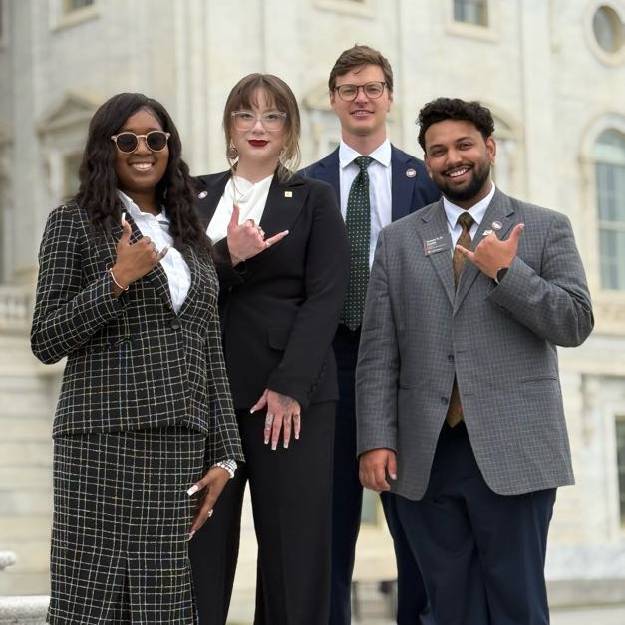Mariana Huselton is an advocate for many causes, but her latest is helping the nation’s “Dreamers” obtain permanent US residence and access to higher educational institutions.

Sponsored by USC’s Graduate Student Association, Huselton traveled to Washington, DC with the GSA Executive Cabinet to advocate support for H.R. 1589 - American Dream and Promise Act of 2025 from South Carolina’s Congressional Representatives.
The Graduate Student Association mission focuses on education and finances for graduate students. Huselton and five other members of the GSA Executive Cabinet met with nine lawmakers on Capitol Hill to advocate for key issues including funding for higher education and GradPLUS student loans, greater support for international students and advancing access policies for graduate and professional students.
We caught up with Huselton on her trip and advocacy efforts.
1. What inspired you to choose H.R. 1589 – the American Dream and Promise Act – as the focus of your advocacy during the trip?
I was inspired to advocate for H.R.1589 because the target population is an underrepresented demographic on our campus. International students make up the second largest demographic of graduate students on campus, but they have conditional visas for attendance unlike Dreamers (eligible people under H.R. 1589) who only have temporary protection from deportation and limited authorization to work or attend post-secondary education. People who qualify for permanent residence through the American Dream and Promise Act of 2025, are individuals who know our country as their home and have no criminal records. This legislation would merely grant them the opportunity to access higher education and provide incentives for proactively contributing to our community. In addition, I personally know a handful of Dreamers who solely desire to be considered for equal rights and opportunities.
2. What was the best moment or conversation you had while advocating on Capitol Hill?
The best moment on Capitol Hill was having a moment to reflect about my identities and abilities for helping create change. This moment happened after a lady in the restroom pointed out that the thread holding together the back flaps of my blazer needed to be removed. I did not know this and considered it a "first gen" moment. I have had my blazer for almost two years and have worn it multiple times, yet no one had told me the thread on the back was meant to be removed. As a first generation Hispanic American, I often recognize the privilege it is to be attending higher education and being in spaces many people from my community have not been in. A moment that could be considered insignificant became a catalyst for reflection.
3. How do you see this legislation affecting South Carolina students if it passes?
If this legislation passes, I can see it affecting South Carolina students by increasing the opportunity to build community with people from different backgrounds and diversifying cultural exposure. Allowing more people the opportunity to apply and attend South Carolina higher education institutions would increase application and graduation rates, which would inherently improve our society as a whole by lowering crime rates, increasing economic development, and improving social environment.
4. What role has your position as Secretary of the committee within the GSA played in shaping your advocacy efforts?
My role as a Secretary of the GSA Executive Committee has shaped my advocacy efforts by empowering me to engage in conversations where personal experiences and research are needed for influencing change. Having the responsibility for this role held me accountable as a leader and advocate within our community.
5. What advice would you give to other graduate students who want to get involved in policy or advocacy work?
I would advise other graduate students interested in policy or advocacy work to connect with their peers who share interests and get involved on campus. Staying connected and involved in hands-on projects through the university provides experiential learning, professional confidence and opportunities to practice this work.
For more information on USC’s Graduate School Association or to get involved, go here.